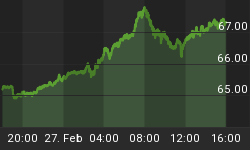The White House announced it was getting into the commodities game in an effort to protect consumers from some of the geopolitical factors spilling over into the retail gasoline market. OPEC and the IEA both said in their monthly reports that market perceptions were behind higher energy prices, not physical shortages. With most U.S. consumers still economically gun shy, gasoline consumption is down amid high retail prices. But on the business side, protection against potential oil shocks in the long-term could help push a reinvigorated U.S. economy over the recessionary hump. Apart from the murky waters of economic nuance, however, President Obama said that, no matter what, American commuters need gasoline. Speculation aside, maybe that's the problem.
High gasoline prices make for angry constituents. That means politicians, especially politicians fighting to keep their paychecks, start pointing their legislative guns at Wall Street almost as soon as the gavel strikes. Market indices don't particularly care one way or the other if consumers and lawmakers are frustrated, but they are concerned nonetheless. U.S. lawmakers in March complained to the Commodity Futures Trading Commission that nobody was watching energy markets closely because perceptions are trumping real-world scenarios. Demand is down and supplies are up, which typically means prices drop. But not so fast, the critics say. Someone must be cheating.
Energy wonks note, correctly, that hedging your energy bets is a good way to protect against future shocks. Imagine how much plane tickets would cost if the airline industry practiced a just-in-time policy for its fuel needs. The same would likely hold for refineries and oil producers. But that doesn't mean much for the average consumer when gasoline prices can increase as much as 10 percent overnight because Iran's Press TV ran a false report about a Saudi pipeline explosion, or U.S. refineries closed for maintenance or the weather suddenly turned colder or any of the other reasons cited for volatility in consumer gasoline prices.
It's getting close to the so-called driving season in the United States when Americans take to the road for their summer vacations. But gasoline demand is down more than 3 percent compared with the same period last year. That may be because of improved fuel economy, a lack of general consumer spending or because of sluggish employment numbers means nobody has a job or vacation to drive to anyhow. Yet, the government said gasoline prices are starting to come down. But no matter. U.S. lawmakers, including the president, made a big show of their rhetoric on gasoline, jobs, energy security, American families and the like.
"Obviously rising gas prices means a rough ride for a lot of families," said Obama. "Whether you're trying to get to school, trying to get to work, do some grocery shopping, you have to be able to fill up that gas tank."
And therein lies the problem. Most commuters go to school, get to work and run errands using a vehicle that runs on gasoline. Gasoline is a necessity and that's in part why the debate ensues. Without massive subsidies, gasoline is going to get more expensive no matter what the politicians say. And until commuters move beyond the carbon mindset, that ride to work will continue to be a rough one.
Source: http://oilprice.com/Energy/Gas-Prices/Gasoline-is-Expensive-Deal-with-it.html
By. Daniel J. Graeber of OilPrice.com















